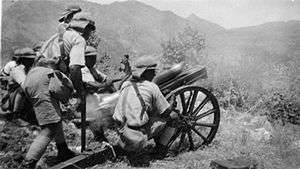Ahmed Barzani
Ahmed Barzani (1896 – 11 January 1969) (Kurdish: ئهحمهد موحهممهد بارزانی / Ehmed Mihemed Barzanî), also known as Khudan (Kurdish: Xodan / خودان), was the head of the Barzani tribe in Kurdistan. Sheikh Ahmed is considered to be the architect of Barzani rule in Iraqi Kurdistan. He was a Kurdish nationalist who brought many different Kurdish tribes under his command and expanded the Barzan region. Along with his younger brother Mustafa Barzani, he fought against the Iraqi government in the 1920s and 1930s.
Sheikh Ahmed Barzani | |
|---|---|
| Nickname(s) | Xodan / خودان |
| Born | 1896 Barzan |
| Died | 1969 |
| Allegiance | Peshmerga |
| Battles/wars | Ahmed Barzani revolt |
Barzani revolts

The first of the major Barzani revolts took place in 1931 after Mustafa Barzani, one of the most prominent Kurdish leaders in Iraqi Kurdistan and the brother of Ahmed, succeeded in defeating a number of other Kurdish tribes who questioned their dominance.[1]
He was later forced to flee to Turkey, where he was held in detention and then sent to exile in the south of Iraq. He headed Barzan's largest revolution from 1931 to 1937 and gained the respect of many Iraqi Army generals who were fighting him, such as General Abdul-Jabar Barznji the commander of Iraqi Army in Barzan region.
Barzani was the center of focus of the British, Iraqi and Turkish discontent. He was very sympathetic to the Kurdish movements in the North led by Khoyboun (the Ararat Revolt). He received many Kurds who were seeking sanctuary in Barzan, including Kor Hussein Pasha. In September 1930, a Turkish military attaché in Baghdad told Iraq's Prime Minister Nuri Said, "the Turkish military operations in Ararat were very successful. The army will carry similar operations to the west of the Lake of Wan. We expect these operations to come to an end soon. The Turkish army will mobilize along the Iraq-Turkey border if the Iraqi Army moves against the Sheikh Barzan. In fact, Ismet Inonu complained to Nuri Said in Ankara that Sheikh Ahmed was supporting the insurrection in Ararat (see Archive E4976/1932/93, dated 4SEP1930)
Environmental protection
Barzani was the first known Kurdish environmentalist and conservationist leader. He enforced regulations to maintain a clean and sustainable environment. He prohibited, among other things:
- Cutting down trees, especially those which provide shade and prevent erosion
- Overharvesting honey
- Killing non-poisonous snakes.
- Fishing with dynamite and other explosives
- Hunting during breeding season.[2]
Barzani's legacy
Barzani rejected the traditional way of maintaining leadership within the same family. He emphasized that whoever takes the lead must be qualified for such a job. He condemned the corruption which was beginning to take part within the Kurdish Movement and was highly critical of ignoring the oppressed masses who were the victims of the movement's failures.[2] He is also credited with emphasizing that marriage should be voluntary: such freedom he considered a basic civil right and stressed it publicly.[3]
References
- The Kurdish Minority Problem, p.11, Dec. 1948, ORE 71-48, CIA "Archived copy". Archived from the original on 8 March 2012. Retrieved 15 March 2012.CS1 maint: archived copy as title (link).
- "Archived copy". Archived from the original on 5 December 2008. Retrieved 5 December 2008.CS1 maint: archived copy as title (link)
- Mohammadi, Mazhar. "The Assassination of the Spiritual Guide: Introduction". Kurdish Aspect. Archived from the original on 13 July 2011. Retrieved 29 June 2011.